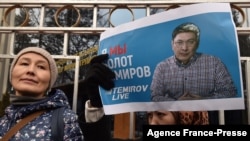Kyrgyz media have condemned the arrest by Kyrgyzstan authorities of an investigative journalist the U.S. State Department has named an anti-corruption champion.
Bolot Temirov, founder of the independent news website Temirov LIVE, was arrested on Saturday after a raid by drug control officials in the capital, Bishkek.
Temirov was detained and forcibly removed from his office. Police also confiscated computer equipment, documents, and video surveillance camera recordings.
The Interior Ministry said that cannabis was found on Temirov during the search.
Temirov denies the accusation and said that drugs were deliberately put in his pocket. He believes the arrest is linked to recent reporting on alleged high-level corruption.
On January 20, Temirov Live alleged that relatives of Kamchybek Tashiev, who is head of the State Committee for National Security, were involved in a corruption scheme involving a state-owned refinery.
The day after Temirov’s arrest, Tashiev said the reporting contained “blatant lies” and that he had "not stolen a single som [Kyrgyz currency] from the state.”
Tashiev said that the State Committee for National Security had nothing to do with the raid on the media outlet.
Charge questioned
After the raid, police questioned Temirov in the presence of lawyers at the Bishkek police department and released him on the agreement that he not leave the city and sign a nondisclosure agreement, according to his lawyer.
The following day, a court charged Temirov with drug possession and released him on bail.
After leaving the courtroom, Temirov told reporters he believed the arrest was "directly related" to the story on Tashiev’s family.
International bodies and rights groups, including the nongovernmental Norwegian Helsinki Committee and New York-based Committee to Protect Journalists, have questioned the drug charge and said Kyrgyz authorities should investigate claims that police planted evidence on the journalist.
Kyrgyzstan President Sadyr Japarov commented on the arrest Sunday, saying Temirov “will be investigated fairly” and that he would closely monitor the case.
“At the same time, I would like to ask journalists to refrain from public slander and unsubstantiated accusations against anyone,” he said in a post shared on Facebook.
Corruption reporting
Temirov is well known in Kyrgyzstan for reporting on corruption, and in 2021 was one of 12 people recognized by the U.S. State Department as an anti-corruption champion.
The journalist was honored for his “long career” investigating organized crime and high-level corruption.
The U.S. State Department reacted to Temirov’s arrest on Monday, saying, “A free media is vital to fighting corruption.”
In a statement on Twitter, the State Department spokesperson Ned Price added, “As a committed partner in the Kyrgyz Republic’s anti-corruption efforts, the U.S. recalls our shared commitments to protect press freedom, including for journalists whose work helps to bring transparency to public affairs.”
At the time of his State Department award, Temirov was chief editor of the news website FactCheck, which investigated a $700 million scandal allegedly involving former deputy Customs Service chief Raimbek Matraimov.
The U.S. has sanctioned Matraimov, who last year pleaded guilty to corruption charges.
Shortly after the report was published, Temirov was beaten by three unidentified attackers.
Media solidarity
Protesters gathered in the Kyrgyz cities of Bishkek and Osh this week to demonstrate against Temirov’s arrest.
Kyrgyz journalists who joined the protest said that a free media is vital for Kyrgyzstan’s development.
"When will Kyrgyzstan develop? When corruption stops. If there is no freedom of speech, if corruption grows, we will remain as we are,” said Idris Isakov, a journalist who took part in the protests in Osh. “That is why we are not in a position to turn a blind eye to corruption. That's why we need freedom of speech, that's why we need journalistic inquiries.”
Another journalist, Shohrukh Saipov, said that freedom of the press in Kyrgyzstan was better than in neighboring countries, but that journalists were sometimes threatened.
"Whether we like it or not, journalists are constantly under the control of law enforcement agencies," he said at the Osh protest. “They are also threatened. The case of Bolot Temirov is a clear example of this.”
“Freedom of the press, freedom of thought is the only achievement of the state. However, in recent years, international organizations have reported that freedom of speech and the press in Kyrgyzstan are deteriorating. This is unfortunate,” Saipov added.
Kyrgyzstan ranks 79 out of 180 countries where 1 is freest on the World Press Freedom Index. Its 2021 ranking was a three-point improvement on the previous year according to the data compiled by media watchdog Reporters Without Borders (RSF).
RSF said that media pluralism is “exceptional” in the country but that investigative journalists risk violence, cyberattacks, or being questioned. Exposing corruption “can still be very dangerous,” RSF states.
This story originated in VOA’s Uzbek Service.




